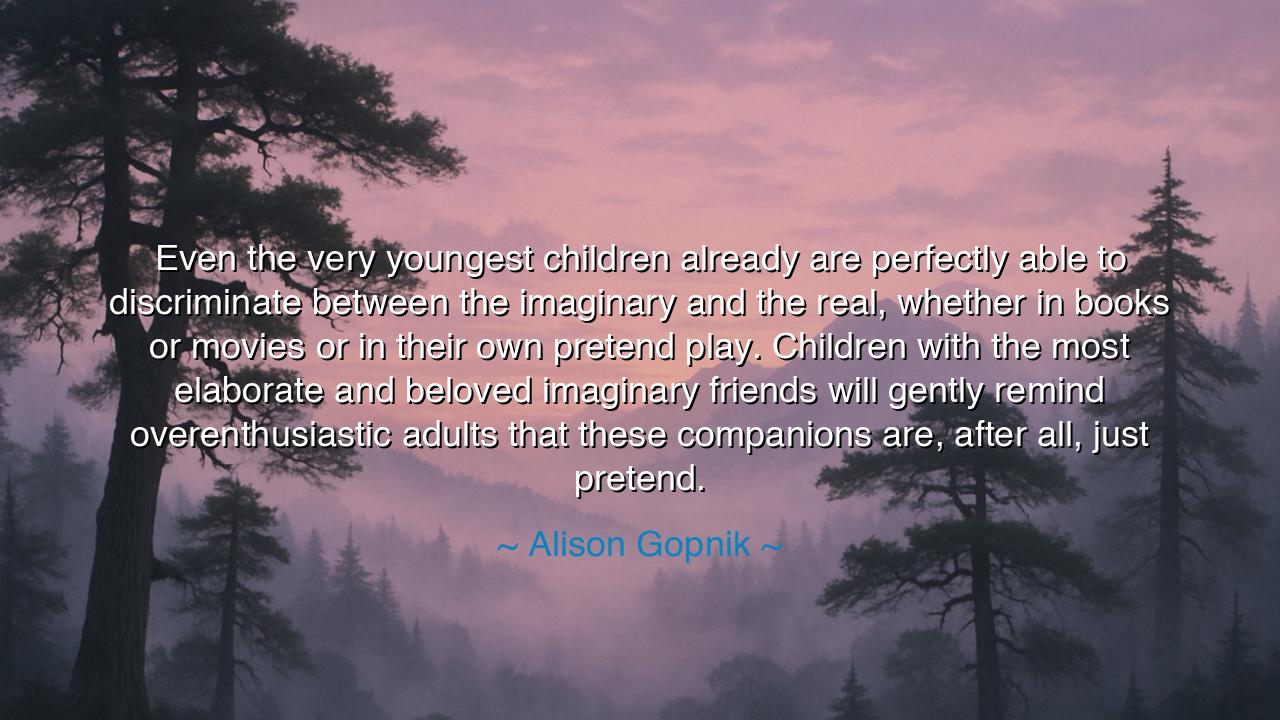
Even the very youngest children already are perfectly able to
Even the very youngest children already are perfectly able to discriminate between the imaginary and the real, whether in books or movies or in their own pretend play. Children with the most elaborate and beloved imaginary friends will gently remind overenthusiastic adults that these companions are, after all, just pretend.






Hear now the words of Alison Gopnik, a voice of insight into the depths of childhood and its understanding of reality and imagination: “Even the very youngest children already are perfectly able to discriminate between the imaginary and the real, whether in books or movies or in their own pretend play. Children with the most elaborate and beloved imaginary friends will gently remind overenthusiastic adults that these companions are, after all, just pretend.” In these words, Gopnik reveals a profound truth about the nature of perception, the line between fantasy and reality, and how, even from the earliest moments of life, humans begin to shape their understanding of the world around them.
In the ancient world, the great philosophers and storytellers were deeply concerned with the distinction between what is real and what is imagined. The Greeks understood that the world of the gods and the world of humans were not always easily separated. The stories of Homer were filled with immortal beings who interacted with mortals, weaving a tapestry of reality and myth. But even in these stories, there was an understanding that the divine world and the human world operated by different laws—one of immortal wisdom, the other of fleeting existence. Gopnik’s reflection on children’s ability to distinguish between imaginary and real worlds is a modern echo of this ancient wisdom: that while we may play and dream in fantastical realms, we must always be able to return to the grounded truth of our lived experience.
Consider the great philosophers such as Plato, who in his allegory of the cave, spoke of the human struggle to differentiate between illusion and truth. The prisoners in Plato's cave were bound in such a way that they could only see the shadows on the wall, and for them, these shadows were the only reality they knew. But when one of them was freed, he saw the true world outside, the world of light and substance. Plato's cave speaks to the challenge of seeing beyond appearances, to recognizing the truth that lies beneath. The child, in their play and in their fantasy, creates a shadow world, but they are acutely aware that it is only a shadow—a creation of the mind, not the substance of reality. The ability to distinguish between the two is a sign of growing wisdom, much like the philosopher’s journey from the darkness of the cave to the clarity of the outside world.
Think also of the myth of Theseus, who ventured into the labyrinth of Minos to face the Minotaur, a creature that was part of both the real world and the imagined—a fusion of reality and myth. Theseus’ triumph was not only physical but intellectual, as he navigated the twists of the labyrinth and separated the truth of his quest from the illusion of the maze. The ancient hero’s success lay in his ability to discern the path forward, to see beyond false illusions and to recognize the real dangers and opportunities that lay before him. In this same way, the young child, with their playful imaginary friends, understands that while they may live in a world of imagination, they are still bound by the real world—a world of tangible truths.
The lesson in Gopnik's words is clear, O wise ones: even from an early age, clarity of perception is an essential part of growing. While imagination and fantasy are vital for creativity and exploration, the ability to differentiate these from the real world is what allows one to live with integrity and wisdom. The ancients understood that the human mind is constantly balancing between the world of ideas and the world of physical existence. The philosopher, like the child with their imaginary friends, must engage with both realms, but always with an eye on the truth of the material world. Just as Socrates challenged his students to examine their beliefs, so too must we challenge ourselves to reflect on the stories we tell and the worlds we create, always returning to the solid foundation of reality.
Reflect, O future generations, on how often you, too, may get lost in the shadows of your own thoughts, in the dream world of your own imagination. Just as the child knows when to return to the real world, so must you understand when to step back from your own creations and engage with the tangible truth of your life. In a world filled with distractions, both real and imagined, the ability to see clearly, to separate fantasy from reality, is a gift that must be nurtured. Let the child’s natural wisdom serve as a model: they create and dream without losing their grip on what is truly important.
Thus, O seekers, take heed of the lessons passed down through the ages: while the world of imagination is a rich and necessary part of the human experience, we must always return to the world of truth and reality. The child with the imaginary friend, though lost in their play, knows deep down that it is only a game, and in this understanding lies the wisdom of their age. Just as the ancients sought the balance between the divine and the mortal, the true and the false, so too must you seek to balance the worlds of your own imagination with the truths that ground you. For it is in this balance that we find the path to wisdom and clarity, and to the peaceful embrace of both worlds.






AAdministratorAdministrator
Welcome, honored guests. Please leave a comment, we will respond soon